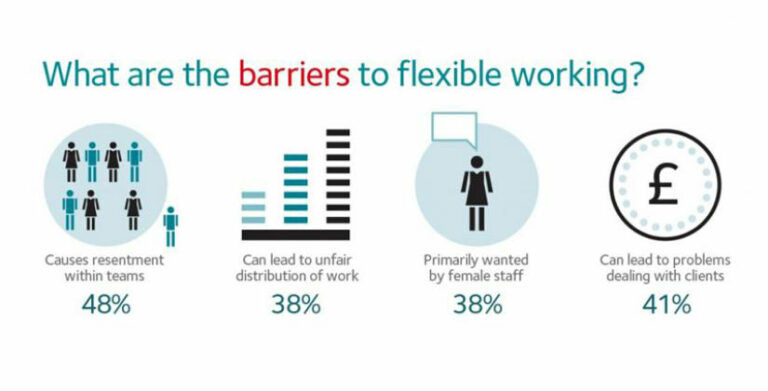Why aren’t companies embracing flexible working?
There is no doubt that flexible working is changing the way the UK does business, and many have suggested that the 2012 Olympics was a catalyst for firms to adopt flexible working on a regular basis.
We debated the pros and cons of flexible working on our blog only last month, but recent studies have revealed different ideas, and sometimes conflicting findings, on the benefits and uptake of flexible working.
Redefining working hours
The Institute of Leadership & Management (ILM) describes flexible working as:
- offsite working (e.g. working from home)
- flexible hours
- job sharing or
- part-time or variable part-time working
In its recent study ‘Goodbye nine to five‘, it reported that almost all UK organisations (94%) offer some form of flexible working and that this is standard practice in 50% of companies surveyed.
A huge 82% of managers thought that flexible working was beneficial to their business, in terms of improved staff productivity, commitment and staff retention. But interestingly, the report found that managers who had no experience with flexible working were more negative about the concept, with 27% saying it would be of no benefit to their business. This suggests that managers may need to be educated on the benefits of flexible working, or perhaps that business owners should introduce trials so managers can see the outcomes.
Read the ILM’s recommendations on how to make flexible working a success.

Failing to engage
While the ILM study paints a broadly positive picture regarding uptake of flexible working in the UK, an earlier study this year by O2 suggests that many businesses are failing to reap the benefits this type of working can bring.
It found that while staff were keen to embrace new ways of working, employers were more resistant, with just 19% of respondents saying their company encourages them to work flexibly.
The impact on staff productivity was again highlighted, with 75% of employees saying they are most productive when they are able to change when and where they work. It also found that in many cases staff were not aware that their employers had flexible working policies, or could provide tools or technology to allow remote working. This suggests that businesses do not always communicate this effectively.
O2 Business Director, Ben Dowd, says: “It’s shocking that less than one fifth of people feel they are encouraged to work flexibly. Businesses must sit up and take notice of this critical evolution in employee behaviour and create a business culture equipped to support it. Talking about it simply isn’t enough. To create a truly flexible working culture, actions speak louder than words.
“The changes we’ve seen in our own workforce since our pilot speak for themselves. With the right mix of technology, policy and education, Britain’s workforce can embrace the opportunities that flexible working can bring in helping them shape their own definition of the 9 to 5.”
Tailor your needs
Bizspace has a range of products and services designed to help our customers work flexibly. These include:
- secure, 24-hour access to many of our business centres and industrial estates.
- secretarial support as and when you need it
- mailboxes and virtual offices to support home workers
- meeting rooms to rent by the hour across the country
- our flexible terms, which can be tailored to your business needs
We are also soon launching an exciting co-working service to further aid flexible working.
Search for a location online to find out what services are available at a centre near to you.
Author:
BizSpace
BizSpace is the UK’s leading provider of regional flexible workspace. For over 20 years we have been offering office, studio and workshop units to a wide range of businesses in convenient regional locations across the country. We are owned by Sirius Real Estate, a commercial property operator, that is supporting us on a journey to significant growth.
More BizSpace News

Blog
Finding a Small Industrial Unit or Workshop to Rent
Let’s be honest with each other, finding a ‘perfectly sized’ industrial unit for your business isn’t exactly fun. It’s time-consuming,…
Find out more
Blog
Designing your ideal office: 8 top tips
Focus on comfort and practicality when designing your office space, considering layout, light, furniture, clutter and accessories.
Find out more
Blog
What is a Satellite Office?
Businesses are now finally able to return to some sense of normality in our post-COVID society. There has been plenty…
Find out more